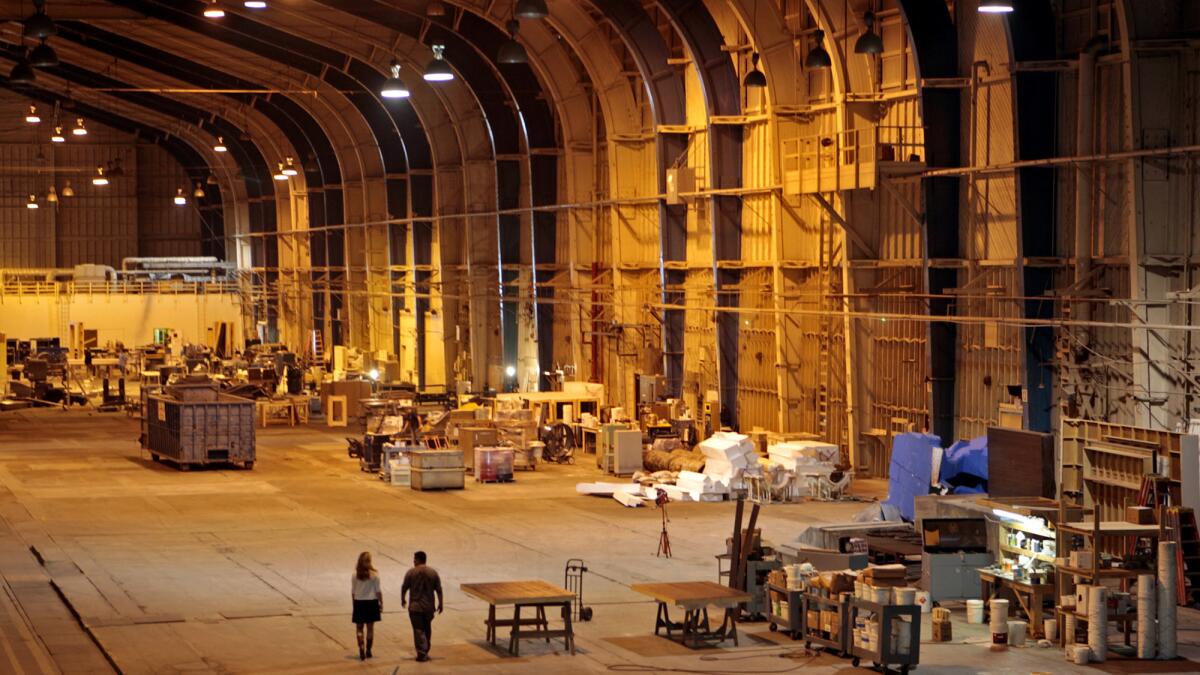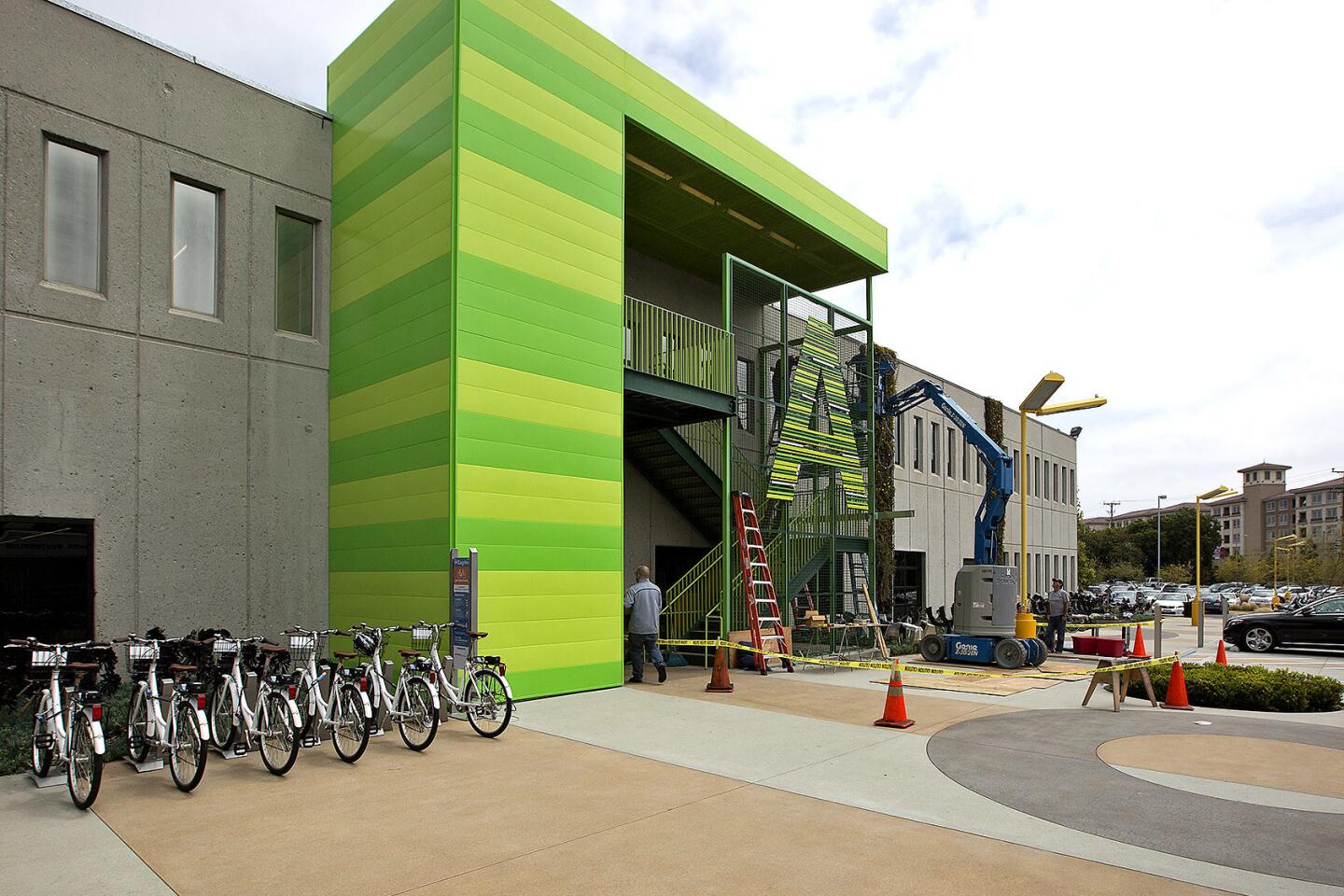Neighborhood Spotlight: Playa Vista has master-planned convenience, but developing an identity will take time
- Share via
The land on which Playa Vista sits on was, for thousands of years, a salt marsh that was fed by the Los Angeles River before its course shifted south to empty in San Pedro Bay in 1825.
The Tongva people called the area Washna and laid their dead to rest in a large burial ground in the shadow of the Westchester Bluffs. The Spanish used the area for grazing and called it Rancho La Ballona. In the 1900s, oil was struck in the westernmost edge of the wetlands, and it was re-dubbed the Playa del Rey Oil Field.
When Howard Hughes needed more space to build his newest bomber in 1940, he bought hundreds of acres of the wetlands, diverted Centinela Creek to keep his runway dry and built what he called the Hughes Culver City Plant.
It was a massive operation, with the world’s longest private runway and tens of thousands of square feet of hangars and manufacturing facilities. The infamous Spruce Goose was built there before being trucked to Long Beach for its first and only flight.
In 1986, the Culver plant shut down, and the historic hangars were abandoned. They soon found a second life in the 1990s as Hollywood sought ever-bigger soundstages to film modern blockbusters, with “Titanic,” “Avatar” and “Iron Man” among the movies that were shot in the gigantic Spruce Goose hangar.
The interest from Hollywood led developers to include a massive studio complex in the plans for a mixed-use development that was now being called Playa Vista. The scale of the project was huge, and it faced fierce opposition from residents of neighboring communities. The developers made density concessions, agreed to pay for the rehabilitation of the remaining wetlands and were allowed to move forward with construction.
The studio component was abandoned in the mid-1990s, but the plan to develop office space designed to attract tech firms that worked with the entertainment industry remained intact.
That would pay off in the 2000s as tech giants Google, Microsoft and Facebook began to move their L.A. operations to Playa Vista, marking this former marshland the red-hot center of Silicon Beach.
Neighborhood highlights
Master-planning: In Playa Vista it’s possible to work where you live, live where you work, and in your off-time catch a movie or hang out at the park.
Tech utopia: The dense concentration of tech companies such as Google and Facebook, which offer high-paying tech jobs in beautiful new architecturally significant office buildings, help makes Playa Vista the apex of the L.A. tech scene.
Beach-adjacent living: The heart of Silicon Beach may not literally be on the water, but Playa del Rey, Marina del Rey and Venice Beach are just minutes away.
Neighborhood challenges
No “there” there: It may develop over time, but at this early stage, Playa Vista has no real distinguishing characteristics, other than its extreme newness. Minus the ocean breezes it could be in San Jose or Austin.
Expert insight
Dennis Hsii, owner of Playa Vista Premiere Real Estate Group and a resident of Playa Vista, said the neighborhood has a little bit of everything for everyone, from residential neighborhoods to retail and restaurants — and more are on the way.
He said the neighborhood puts on such activities as movie screenings and concerts in the park and holiday festivals for children, which adds a community feel to the area.
“You can immediately go outside and bump into your neighbors,” he said. “People come here and feel like they are at a resort. They don’t have to get into their cars and can just be in the community.”
For potential homeowners, Hsii recommended visiting Playa Vista’s welcome center and going on an hour-long walking tour offered Saturday and Sunday mornings.

Market snapshot
Within the boundaries of Playa Vista is Playa Vista Elementary, which scored 900 out of 1,000 in the 2013 Academic Performance Index.
Nearby schools include El Marino Elementary and Cowan Avenue Elementary, which scored 944 and 829, respectively. Marina del Rey Middle had a score of 743, and Orville Wright Middle scored 737. Culver Park High had a score of 578.
Report card
In May, based on 11 sales, the median sales price for condominiums in the Playa Vista area was $963,000, according to CoreLogic. That was a 2.4% increase in median price over the same month the previous year. There were no single-family home sales during the month.
Times staff writer Rachel Spacek contributed to this report.
MORE FROM HOT PROPERTY
Bronson Canyon living with a side of heavy metal
PartyNextDoor drops $2.5 million on Mediterranean mansion in Ventura County
Soap stars Adrienne Frantz and Scott Bailey are ready to part with Studio City home
More to Read
Sign up for Essential California
The most important California stories and recommendations in your inbox every morning.
You may occasionally receive promotional content from the Los Angeles Times.








